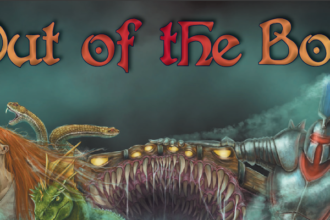5 Shakespeare Plays Perfect for D&D

For some, Shakespeare means amazing stories, fantastic characters, and romantic prose. For others, it is akin to nails on a chalkboard. Occasionally even mentioning the name Shakespeare can get a groan or a sigh out of people. The problem being that far too many people had their first exposure to the Bard reading the text in boring English classes or listening to venerable old actors croak out lines on a recording. This method of painful delivery no doubt scarred many people for life and gave Shakespeare a bad reputation.
Thankfully, for some of us, the exposure to Shakespeare was quite pleasant as it was done the correct way; that being, watching a live performance by trained and talented actors. Do you really think Shakespeare ever intended for anyone to sit down and read his plays? I highly doubt it since the literacy rate in England at the time was only about 20-25% for males and 10-15% for females. Another clue might be that his plays were never collected into a folio until 1623, almost seven years after his death. In fact, I think he would have been appalled to learn that his words have been reduced to required reading for millions of students who would never actually get to see his work on the stage.
Regardless whether you grew up loving, hating, or simply indifferent to Shakespeare, I highly recommend that if you love D&D, you give the Bard the respect that he deserves and use him as a powerful role-model. The reasons being the enchanting nature of his stories, the powerful presence of his characters, and the influence his works have had and still are having on the entire world. Not to mention how he has influenced, mentored, and inspired thousands of writers and artists after his time. Even the forefathers of D&D could not deny that Shakespeare had a great deal of sway on their ideas and stories. Trust me, understanding and appreciating his works can open up a whole new array of doors and windows for your D&D games.
To highlight what I mean, what follows are five of Shakespeare’s most D&D compatible plays and how each of them could be easily converted into a campaign or storyline (in alphabetical order):
Anthony & Cleopatra
“In time we hate that which we often fear.” (Act 1, Scene 3)
Anthony & Cleopatra has a little bit of everything to offer. It is comedic, romantic, violent, and tragic depending on the scene. For a D&D campaign to work with this storyline, one would have to grasp the military situation of the time. Rome, under Octavian Caesar, declared war on Mark Anthony, Cleopatra, and all of Egypt in 32 BC for being disobedient vassals and holding back on the grain shipment Rome required to feed its people and soldiers. In response, Anthony took command of Egypt’s armies and fleets and provoked Rome into several skirmishes which came to head at the Battle of Actium on September 2, 31 BC. The Egyptian Fleet was decimated, in part to the battle plans being betrayed to the Romans by one of Anthony’s men, and the war went rapidly downhill from that point forward. Roughly a year later, with their armies spent and the Romans closing in, both Anthony and Cleopatra would commit suicide. With this victory in hand, Octavian, nephew to Julius Caesar, would become the first emperor of Rome. If you don’t see the campaign potential in all of that, then may the fates be with you!
Julius Caesar
“Cowards die many times before their deaths; The valiant never taste of death but once.” (Act 2, Scene 2)
Although it does not contain the romance and passion of Anthony & Cleopatra, Julius Caesar makes up for it with politics, treachery, and intrigue. It is the great-grandfather of A Game of Thrones and is an excellent snap-shot of one of the most epic moments in human history. For the D&D campaign, I envision a group of young nobles or politicians having their country slowly overrun by a tyrant or a would-be emperor. As such, they are forced to take action and fight against this threat no matter what the cost. On the opposite side of the street, maybe you could make the PCs part of the tyrant’s retinue who think of nothing but revenge for their fallen leader after the deed. There are tons of good plot lines here no matter what direction you want the story to go.
MacBeth
“By the pricking of my thumbs, Something wicked this way comes.” (Act 4, Scene 1)
This classic tale of ambition, power, greed, and revenge is ripe with intrigue and dramatic moments. A Scottish nobleman named MacBeth, empowered by a prophecy that he will be king, takes matters into his own hands and murders the current king. In the resulting uproar, MacBeth takes the throne but is quickly opposed. The resulting civil war is both short and bloody leading to MacBeth’s death. Converting this tale into a D&D campaign could take several forms. The PCs could be a group of noblemen bent on seeing the current king fall and propping themselves up as the new rulers; or they could be followers of the fallen king desperate to see his murder avenged; or they could even be soldiers for either side caught up in the politics of their masters. Also, the geography, culture, and history of old Scotland makes for a terrific campaign backdrop.
Richard III
“Bloody you are. Bloody will be thy end.” (Act 4, Scene 4)
If you are fond of underdogs and crafty physically disfigured men who will go to any lengths to achieve their goals, then this play is for you. Richard III, called Gloucester in the play, pulls every trick in the book to be crowned king: he marries for position, he murders, creates false rumors, and even wages war. All of these dark deeds are capped by his supremely heartless act of ordering his two nephews (ages 9 and 13) executed, presumably to prevent their claims to the throne. In a D&D campaign based on this story/history I would assume that the PCs would play heroic nobles, perhaps even knights, focused on bringing the monster on the throne to justice. However, it might interesting to have an evil alignment campaign going where the PCs are willing to follow in Richard III’s footsteps no matter what the cost.
Titus Andronicus
“O sweet Revenge, now do I come to thee.” (Act 5, Scene 2)
Delving back into the Roman period, Titus Andronicus was Shakespeare’s most violent and bloody play. It centers on Titus, a Roman General, who is well respected and returns to Rome after a successful ten year campaign against the Goths and just as the current Emperor passes away. Titus is quickly pulled into the squabbling over who should be the next Emperor, himself included, and is eventually betrayed by several of his own family members. This leads to multiple murders and executions with few of the main characters surviving to the end. Like Hamlet, when things go bad in a Shakespeare play, things go very bad. For obvious reasons I think of Drow society whenever I think of Titus Andronicus, but it would not be difficult to convert a similar story into a thief’s guild, crime syndicate, or pirate setting. A creative DM might also have fun forging a story like this one around unexpected characters like the normally passive elves or deceptively innocent halflings. Sometimes it’s fun to turn good folks bad.



